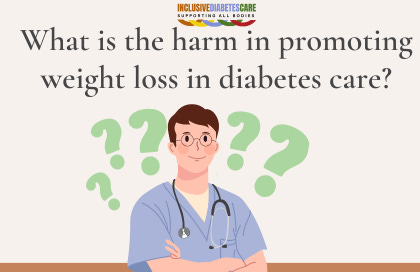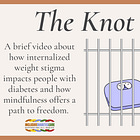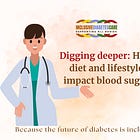What is the harm in promoting weight loss in diabetes care?
Deepen your understanding of how weight stigma and fat phobia impact diabetes care and treatment.
Weight Bias and Anti-fat beliefs
Why does weight-inclusive care matter when helping people prevent or manage diabetes? If you are a healthcare provider, you can play an essential role in reducing the effects of anti-fat beliefs by contributing to it yourself and by providing evidence-based care focused on changing behaviors, not losing weight. In case you missed the memo, weight loss isn’t a behavior but an outcome of many conditions, some of which are within your control, but many more are outside your control.
That’s important because fat phobia contributes to weight bias and weight stigma, which has been shown to have adverse effects on physical and mental health, as well as contributing to the avoidance of preventive healthcare.
The following articles will help you learn about weight bias and stigma in diabetes:
ADCES: Weight Bias Language
What is the harm in promoting weight loss in diabetes care?
The typical messaging surrounding diabetes is goal-based, or outcome-focused, such as lose weight or lose 10% of your current body weight.
Unfortunately, this messaging erroneously associates weight loss with curing or treating diabetes. This unintentional association is popularized in the media and press, with books, websites, and health campaigns to “prevent, beat, defeat diabetes” instead of focusing on the day-to-day support needed to manage diabetes. It is easy to concentrate or emphasize weight-based outcomes, which only reinforce the fallacious notion that weight loss is a behavior. The level of harm that is associated with promoting weight loss is far more complex than avoiding treatment, and it is woven into the research of weight-stigma, weight-bias, and the impact of disordered eating, which we have addressed in separate questions.
The image was taken on May 28, 2019, about a client delaying care because he thought eating ‘better’ would cure diabetes.
The diabetes community is encouraged to look at the erroneous messaging that associates health with weight. The ADCES has clear language guidelines and the ADCES 7 self-care behaviors to help the diabetes community reduce weight stigma and focus on behaviors (not weight) to provide nonjudgmental, patient-centered medical care.
Is Your Physician Curious About Weight-Inclusive Care?
I enjoyed interviewing Lisa Erlanger, MD, president of the Association for Weight and Size-Inclusive Medicine, this month for our Voices of Inclusion segment of the Inclusive Diabetes Care Newsletter.
Helpful Resources to Expand Your Knowledge
Association for Weight and Size Inclusive Medicine. www.awsim.org.
Take the Harvard Implicit Association Test (IAT) for weight to discern if you have weight bias toward individuals with obesity. Often, persons who have obesity have a similar amount of weight bias as those who do not have obesity.
Understanding weight bias in medicine.










